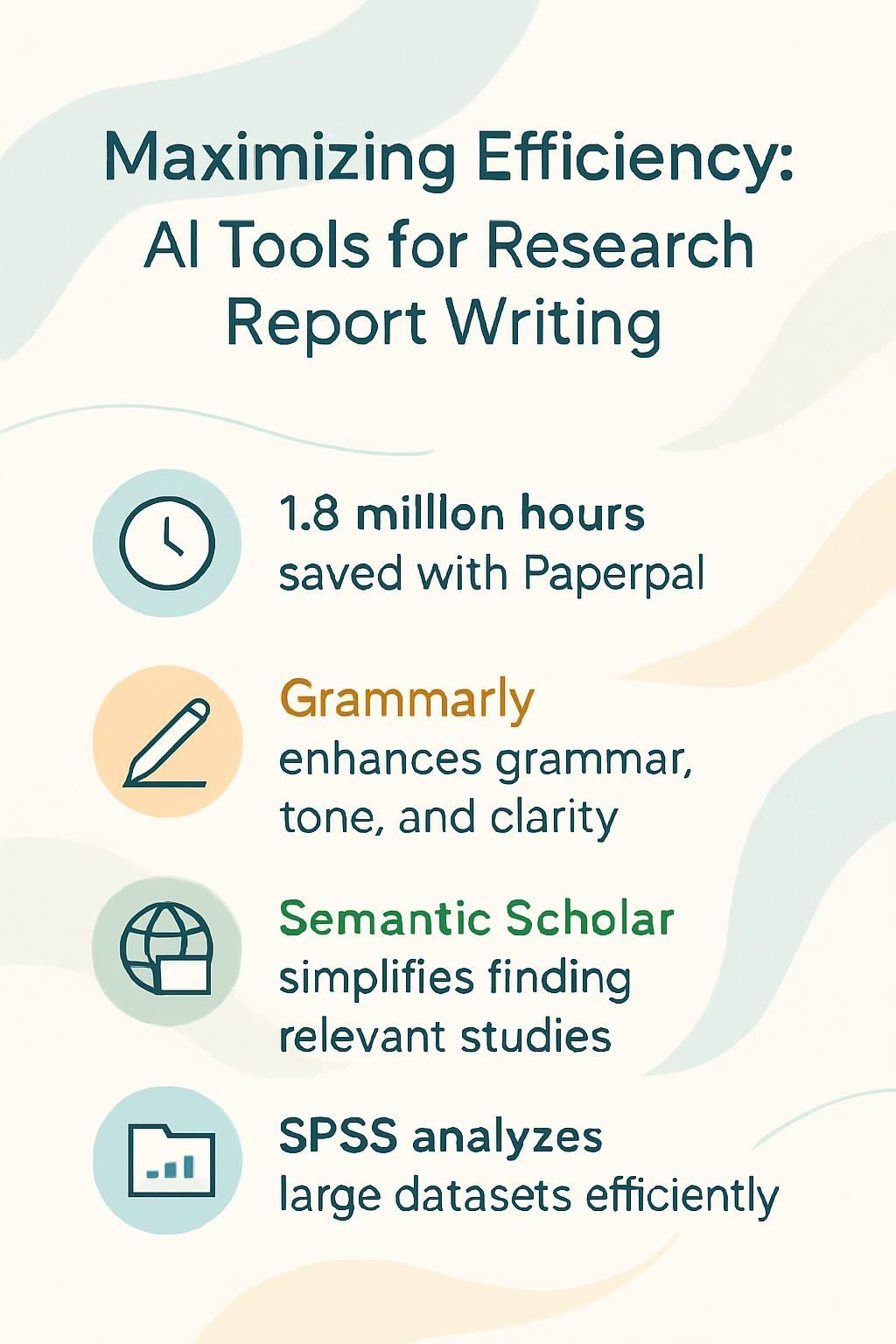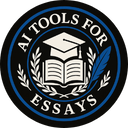Writing a research report can feel overwhelming and time-consuming. AI tools for research report writing are changing how we work, making the process faster and easier. This blog will show you how these tools improve accuracy, save time, and boost productivity.
Keep reading to learn tools and tips that can transform your workflow!
Key Takeaways
- AI tools save time by automating tasks like proofreading, citation management, and data analysis. For example, Paperpal can cut 1.8 million hours of effort.
- Tools like Grammarly and QuillBot improve writing quality by enhancing grammar, tone, and clarity while saving time during editing.
- Semantic Scholar and Litmaps help researchers find relevant studies fast and track citations visually to simplify literature reviews.
- Data analysis tools like SPSS handle large datasets efficiently for quantitative research, while NVivo aids in analyzing qualitative text data such as interviews or surveys.
- Collaboration is easier with cloud-based platforms like Google Docs or Microsoft tools that allow real-time edits and comments from teams anywhere in the world.

Benefits of Using AI Tools for Research Report Writing
AI tools make writing reports faster and easier. They also improve the quality of your research work.
Time Efficiency
AI-powered tools save hours in research and writing. For example, Paperpal can reduce 1.8 million hours of effort by automating tasks like proofreading and formatting. Tools for literature reviews scan thousands of papers quickly, making it easier to find relevant studies.
Time saved is work doubled.
Platforms like Semantic Scholar or Google Scholar help locate scholarly articles fast. These tools simplify data analysis and citation management, streamlining academic workflows.
Enhanced Accuracy
AI tools reduce human error in research writing. Machine learning models analyze data precisely, spotting patterns humans might miss. Tools like plagiarism detection software ensure originality in academic writing.
Natural language processing (NLP) improves grammar and structure.
Data analysis tools, such as coding programs or statistical packages, handle complex calculations quickly. This boosts accuracy in quantitative research or systematic reviews. These technologies offer reliable results, saving time for phd researchers and academics alike.
Streamlined Collaboration
Teamwork becomes easier with cloud-based sharing platforms like Google Docs and Microsoft tools. Researchers can edit, comment, and share documents in real-time. This reduces back-and-forth emails and speeds up the process.
Files stay accessible from anywhere, ensuring smooth collaboration.
Translation tools like DeepL help teams working across languages. They offer instant translations in over 30 languages, making global partnerships more efficient. These technologies bring people together for faster results while keeping research workflows organized.
Deeper Analytical Insights
Strong collaboration boosts better insights. AI tools use predictive analytics and pattern recognition to analyze research data deeply. These tools help find hidden trends, gaps, or patterns in studies that human eyes may miss.
For example, machine learning (ML) algorithms can process large datasets quickly to reveal connections across fields like climate change or cardiovascular health.
AI accelerates discovery while uncovering unseen possibilities.
Natural language processing (NLP) tools enhance literature reviews by summarizing key points from hundreds of articles—saving hours of manual work. Platforms like Semantic Scholar simplify understanding complex reports by focusing on important details.
Researchers also gain clearer findings during systematic literature reviews with these innovations, boosting academic productivity effectively.
Categories of AI Tools for Research Report Writing
AI tools for research writing fall into different types, each built to boost your workflow—read on to find the best fit!
Literature Review Tools
Litmaps makes tracking research simple. It creates visual citation maps to show how studies connect over time. This tool helps researchers stay updated on new academic papers in their field.
Semantic Scholar uses artificial intelligence to improve searches for academic writing. It scans millions of research papers and highlights key concepts, abstracts, and citations. Its user-friendly design boosts efficiency in literature reviews by saving hours of manual searching.
Data Analysis Tools
SPSS helps researchers perform statistical analysis and create clear visuals. It manages large datasets efficiently. This tool is vital for analyzing experimental data or tracking citation metrics in academic writing.
NVivo focuses on qualitative research. It handles text data like interviews, PDFs, or survey responses. Researchers studying social sciences use it to uncover patterns and insights from unstructured information.
Writing and Editing Tools
Grammarly helps fix grammar mistakes and improves tone. It suggests better word choices, catching errors you may miss. Paperpal is another smart tool for academic writing. It focuses on research documents and offers editing tips to match scientific standards.
These tools save time by spotting issues fast. They also boost research productivity with advanced checks for structure and clarity. Pair them with a paraphrasing tool to rewrite sentences while keeping the meaning intact.
Top AI Tools for Research Report Writing
Boost your research writing with smart tools that save time and effort. Discover AI options for drafting, editing, and perfecting reports!
Tools for Ideation and Drafting
Google AutoML helps create machine learning models without coding skills. Researchers can use it to quickly sort data or generate insights for reports. This tool saves time and simplifies complex tasks, making academic writing more efficient.
Paperpal acts as an AI Writing Assistant. It speeds up drafting by helping researchers write twice as fast. Its features are ideal for refining academic research and boosting productivity in projects like literature reviews or scientific writing.
Tools for Citation and Verification
ResearchPal makes citing sources simple. It generates references in multiple formats like APA or MLA, saving time for academic writing. Keeping your research accurate, it ensures proper in-text citations.
Litmaps tracks citations and maps their connections visually. This tool helps you verify sources while analyzing how studies relate to each other over time. It boosts research efficiency with clear citation workflows.
Tools for Editing and Refinement
After citations are sorted, tools for editing and refinement ensure polished reports. Grammarly plays a key role. It checks grammar and tone while offering style suggestions. This AI tool improves clarity by spotting errors instantly.
Its easy-to-use features save time and boost accuracy in academic writing.
QuillBot stands out as a reliable paraphrasing tool. It rephrases sentences to improve flow without losing meaning. Researchers can also use it for summarization tasks when dealing with lengthy drafts or articles.
These tools streamline research workflows, enhancing research productivity step-by-step.
Exploring AI Tools for Literature Review in Article Writing
Litmaps makes it easy to track and map citations visually. It helps in following literature updates without much effort. You can use this tool to collaborate with others on research workflows.
Semantic Scholar, powered by AI, filters articles based on relevance and studies citation trends. With millions of papers available online, this tool saves time for academic researchers during literature reviews.
Google Scholar is another strong option for finding academic materials quickly. It offers an extensive database with in-text citations ready to use. Scopus excels at analyzing citations and linking related articles across various fields like heart rate variability or cyber security topics.
These tools boost research efficiency for PhD researchers while ensuring deeper insights into their data sources through machine intelligence methods like natural language processing (NLP).
Conclusion
AI tools are reshaping research writing. They save time, improve accuracy, and simplify tough tasks like literature reviews and editing. Tools such as QuillBot and Grammarly boost writing quality, while Semantic Scholar enhances searches.
Using AI makes research smoother and more productive. Try these tools to work smarter in your academic projects!
For a deeper dive into how AI can revolutionize your literature review process, check out our comprehensive guide on AI tools for article writing.


Leave a Reply